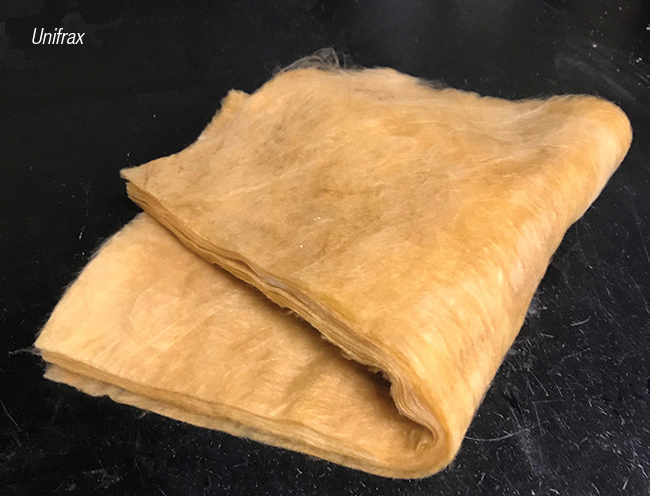A new fibrous catalyst-support material can enhance a wide range of industrial catalytic reactions, allowing higher yields and reduced coke buildup compared to pellet supports. Unifrax (Tonawanda, N.Y.; www.unifrax.com) leveraged its expertise in ceramic materials to develop the high-alumina fiber catalyst support (photo) that can accommodate several different types of catalyst payloads, the company says.

“The fiber support has a highly defined microstructure and porosity, which generates higher specific surface area and more tortuous pathways. This promotes increased interactions between the feedstock molecules and the catalyst active sites, which are coated onto the fiber material,” explains Ashley Cuthbertson, director of platforms program management at Unifrax.
The company developed a proprietary process for coating different catalytic metals onto the fibrous surface in a way that prevents the metals from migrating when in use. Unifrax has also developed a way to customize the support for different processes. “Individual reactors often require customized product forms for the catalyst and support,” comments Kevin Siters, FlexCat technical lead with Unifrax. “Our FlexCat product forms are custom-designed for each system, taking into account pressure drop, flowrates and reaction residence time; and when coupled with an optimized catalyst formulation they are loaded modularly into the reactor.”
In recently completed testing at high-throughput testing company hte GmbH, the fiber-supported catalyst was shown to increase product output by 20% compared to the conventional substrate in a model propane dehydrogenation reaction, while also generating 50% less side products per cycle. Another advantage of the fibrous catalyst support is its light weight — one-tenth the weight of conventional supports — which allows faster loading and unloading and less downtime, Siters points out.
Unifrax has partnered with various catalyst makers to deliver process-ready products, on which a number of users are currently conducting commercial validation testing.